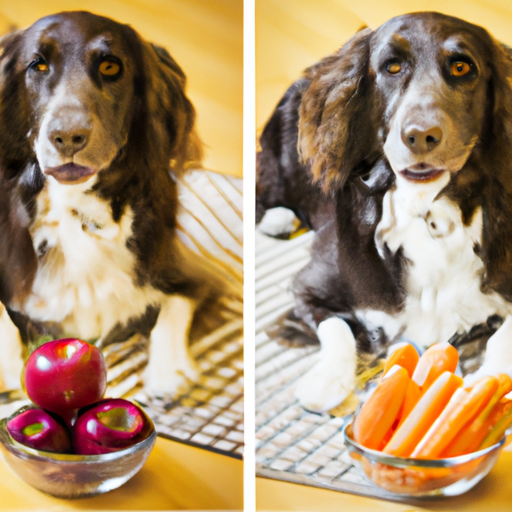As a caretaker for your beloved pet, you are the guardian of their health and well-being. It’s your role to ensure they’re eating a balanced and safe diet. But, with so many human foods available, it can be difficult to distinguish between what’s safe and what’s harmful for your dog. Let’s dive in and learn more about it.
H2: Foods Your Dog CAN Eat
There are a number of human foods that are perfectly safe and even healthy for your dog to consume:
- Lean Meats: Cooked and boneless chicken, turkey, and fish can be excellent sources of protein for your furry friend.
- Fruits & Vegetables: Apples, oranges, bananas, blueberries, cucumbers, and carrots are packed with vitamins and fiber.
- Whole Grains: Foods like rice and oatmeal are good for dogs in moderation.
H2: Foods Your Dog CANNOT Eat
However, not all human food is safe for canine consumption. Some foods can be toxic, and even fatal, to your dog:
- Chocolate: It contains caffeine and theobromine which are toxic to dogs.
- Grapes and Raisins: These fruits can cause kidney failure in dogs.
- Onions and Garlic: They can destroy a dog’s red blood cells, leading to anemia.
H2: The Grey Area Foods
Then there are foods that fall into a grey area — safe for some dogs, but potentially harmful for others.
| Food | Reason |
|---|---|
| Dairy Products | Some dogs have lactose intolerance and can experience gastrointestinal upset. |
| Raw Eggs | They can put your dog at risk for bacterial infections. |
| Alcohol | Even small amounts can cause serious health problems. |
H2: The Importance of Portion Control
Just because a food is safe for your dog, doesn’t mean they should have it in unlimited amounts. Overeating can lead to obesity and other health issues. Always keep treats to less than 10% of their daily caloric intake.
H2: The Role of a Balanced Diet
A balanced diet is crucial for your dog’s overall health. Commercial dog foods are formulated to provide all the nutrients your dog needs. Supplementing with safe human foods can be beneficial, but should not replace their regular diet.
FAQs
Q: Can dogs eat cheese?
A: Yes, but in moderation. Excessive cheese can lead to obesity and other health problems.
Q: Are nuts safe for dogs?
A: It depends on the type of nut. For example, almonds are not recommended, while peanuts are generally safe but should be unsalted.
Q: Can dogs eat raw meat?
A: While dogs can technically eat raw meat, it can carry bacteria and parasites. It’s safer to cook the meat before feeding it to your dog.
Q: Is it okay to feed my dog fish?
A: Yes, fish is a great source of protein for dogs. Make sure it’s cooked and boneless.
Q: Can dogs eat bread?
A: Yes, but it should not form a large part of their diet. Also, avoid feeding them bread dough as it can expand in their stomach.



